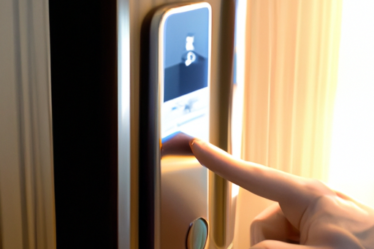
The Impact of Technology on Hotel Operations
The hotel industry has always been known for its ability to adapt and evolve with the changing times. In recent years, one of the biggest trends that has had a significant impact on hotel operations is the rapid advancement of technology. From online booking platforms to smart room features, technology has revolutionized the way hotels operate and provide services to their guests.
One of the most noticeable changes brought about by technology is the shift towards online booking platforms. Gone are the days when guests had to call the hotel directly or visit a travel agency to make a reservation. With just a few clicks, guests can now book their stay at a hotel of their choice from the comfort of their own homes. This has not only made the booking process more convenient for guests but has also allowed hotels to streamline their operations and reduce the need for manual reservation systems.
In addition to online booking platforms, technology has also played a significant role in enhancing the guest experience during their stay. Many hotels now offer smart room features that allow guests to control various aspects of their room, such as lighting, temperature, and entertainment, through a mobile app or voice commands. This level of personalization and convenience has become increasingly important to guests, and hotels that are able to provide these features are often seen as more modern and forward-thinking.
Furthermore, technology has also improved the efficiency of hotel operations behind the scenes. For example, the use of property management systems (PMS) has become commonplace in the industry. These systems allow hotels to manage their reservations, check-ins, and check-outs more efficiently, as well as track guest preferences and provide personalized service. By automating these processes, hotels are able to save time and resources, allowing staff to focus on providing a better guest experience.
Another area where technology has made a significant impact is in the realm of guest communication. With the rise of social media and messaging apps, hotels now have more channels than ever to interact with their guests. Many hotels have embraced this trend by using social media platforms to engage with guests, provide updates, and address any concerns or inquiries. This direct line of communication has not only improved guest satisfaction but has also allowed hotels to build stronger relationships with their guests and gain valuable feedback.
However, it is important to note that while technology has brought about many positive changes in the hotel industry, it also presents its own set of challenges. One of the main concerns is the potential threat of data breaches and privacy issues. With the increasing amount of personal information being collected and stored by hotels, it is crucial for them to invest in robust cybersecurity measures to protect guest data and maintain their trust.
In conclusion, technology has had a profound impact on hotel operations in recent years. From online booking platforms to smart room features, hotels have embraced technology to enhance the guest experience and streamline their operations. However, it is important for hotels to strike a balance between embracing technology and maintaining the personal touch that has always been a hallmark of the industry. By doing so, hotels can continue to adapt and thrive in the ever-changing landscape of the hotel industry.
Sustainable Practices in the Hospitality Industry

The hotel industry is constantly evolving, and one of the current trends that has gained significant traction is the adoption of sustainable practices. As more and more people become aware of the impact of their actions on the environment, hotels are taking steps to reduce their carbon footprint and promote eco-friendly practices.
One of the key sustainable practices in the hospitality industry is energy conservation. Hotels are implementing various measures to reduce their energy consumption, such as using energy-efficient lighting and appliances, installing smart thermostats, and utilizing renewable energy sources like solar panels. By doing so, hotels not only reduce their environmental impact but also save on energy costs, which can be significant in the long run.
Water conservation is another important aspect of sustainable practices in the hotel industry. Hotels are implementing water-saving measures such as low-flow showerheads and faucets, dual-flush toilets, and rainwater harvesting systems. These initiatives not only help conserve water but also reduce the hotel’s water bills. Additionally, some hotels are also implementing water recycling systems to reuse water for non-potable purposes like irrigation or cleaning.
Waste management is a significant concern in the hospitality industry, and hotels are taking steps to minimize their waste generation and promote recycling. Many hotels have implemented recycling programs in guest rooms and public areas, providing separate bins for different types of waste. Some hotels have even gone a step further by composting organic waste and using it for landscaping or donating it to local farms. By reducing waste and promoting recycling, hotels contribute to a more sustainable future.
Another sustainable practice gaining popularity in the hotel industry is the use of eco-friendly materials and products. Hotels are opting for sustainable building materials like bamboo flooring, recycled glass countertops, and low VOC paints. They are also using eco-friendly cleaning products and toiletries that are free from harmful chemicals. By choosing these products, hotels not only reduce their environmental impact but also provide a healthier and more sustainable environment for their guests.
In addition to these practices, hotels are also focusing on promoting sustainable transportation options. Many hotels now offer electric vehicle charging stations, bike rentals, and shuttle services to reduce the reliance on private cars. By encouraging guests to use sustainable transportation options, hotels contribute to reducing carbon emissions and promoting a greener way of travel.
Overall, sustainable practices in the hotel industry are not only beneficial for the environment but also for the hotels themselves. By adopting these practices, hotels can reduce their operating costs, attract environmentally conscious guests, and enhance their brand image. As more and more hotels embrace sustainability, it is expected that these practices will become the norm rather than the exception in the hospitality industry.
In conclusion, sustainable practices in the hotel industry are on the rise, driven by the growing awareness of environmental issues. From energy and water conservation to waste management and the use of eco-friendly materials, hotels are taking steps to reduce their environmental impact. By adopting these practices, hotels not only contribute to a more sustainable future but also reap the benefits of cost savings and enhanced brand image. As the hotel industry continues to evolve, it is crucial for hotels to embrace sustainable practices and play their part in creating a greener and more sustainable world.
The Rise of Personalized Experiences in Hotels
The hotel industry is constantly evolving to meet the changing needs and preferences of travelers. One of the current trends in the industry is the rise of personalized experiences in hotels. Gone are the days of cookie-cutter accommodations where every room looks the same and every guest is treated the same. Today, hotels are striving to provide unique and tailored experiences for each individual guest.
One way hotels are personalizing the guest experience is through technology. Many hotels now offer mobile apps that allow guests to customize their stay before they even arrive. Guests can use these apps to select their preferred room type, request specific amenities, and even order room service. This level of customization allows guests to have a more personalized and convenient experience during their stay.
Another way hotels are personalizing the guest experience is through personalized recommendations and services. Hotels are using data analytics to gather information about their guests’ preferences and interests. This information is then used to provide personalized recommendations for dining, entertainment, and activities in the area. For example, if a guest has indicated an interest in art, the hotel might recommend local art galleries or offer discounted tickets to a nearby museum. These personalized recommendations help guests make the most of their stay and create memorable experiences.
Hotels are also focusing on creating unique and immersive experiences for their guests. Many hotels are partnering with local businesses and attractions to offer exclusive experiences that can’t be found anywhere else. For example, a hotel might partner with a local winery to offer a private wine tasting for their guests. These unique experiences not only provide guests with a memorable stay but also support local businesses and help create a sense of place.
In addition to personalized experiences, hotels are also focusing on creating a sense of community for their guests. Many hotels now offer communal spaces where guests can gather and connect with each other. These spaces might include rooftop bars, co-working areas, or communal kitchens. By providing these communal spaces, hotels are creating a sense of belonging and fostering connections among their guests.
The rise of personalized experiences in hotels is driven by the desire to create memorable and unique stays for guests. Hotels understand that travelers are looking for more than just a place to sleep – they want an experience that is tailored to their individual preferences and interests. By offering personalized recommendations, unique experiences, and communal spaces, hotels are able to provide guests with a truly personalized and memorable stay.
In conclusion, the hotel industry is embracing the trend of personalized experiences. Through the use of technology, hotels are able to offer guests the ability to customize their stay before they even arrive. Personalized recommendations and services based on guest preferences are also becoming more common. Hotels are partnering with local businesses to offer unique and immersive experiences that can’t be found anywhere else. Additionally, hotels are creating communal spaces to foster connections among guests. The rise of personalized experiences in hotels is a response to the changing needs and preferences of travelers, and it is a trend that is likely to continue shaping the industry in the years to come.


